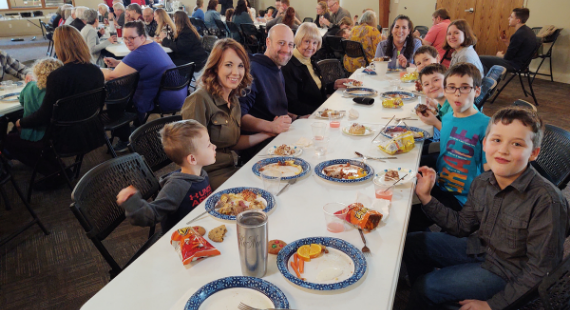Like ocean waves and seagulls on a warm beach, the sound was intoxicating. I was just kicking back and listening at Grace Baptist Church in St. Paul, Nebraska, soaking in a sound that I had not heard in over a year. It was the benevolent buzz of a room full of happy hearts and contented tummies indistinguishably discussing life across potluck tables.
My friends, potlucks have reopened across the Heartland!
No offense to our beloved teachers and pastors, but what COVID-19 taught us is that we crave interactive fellowship more than livestreamed lessons. Though the teaching and application of God’s word is a critical purpose of the church, so are the personal connections that come from going house to house, breaking bread with one another, praying with one another and meeting each other’s needs. Pandemic restrictions caused us to feel, perhaps in a more profound way, that we were not created to consume only. We are also designed to produce.
Once upon a time, people were content to consume. When they wanted a car, they went to their local car dealership. When they wanted clothes, they went to a retail store. When they needed to stay overnight, they would get a hotel room.
In other words, people consume their needs and wants from organizations that offer a one-way pipeline of goods and services. Organizations delivering such one-way streams of goods and services to consumers are called pipelines. Have you seen any stores go out of business lately? The list of pipeline organizations is decreasing daily.
Today, people are not content to only consume. The creative image of God stamped upon us compels people to be creatively productive. Organizations that facilitate people in both consuming and producing goods and services are called platforms. Today, platforms are devouring pipelines.
Consider Uber. They have a higher valuation than some car manufacturers, and they don’t even own a vehicle. They are a platform that contractually connects people who both offer and need transportation. I can earn money for giving people a ride in my car, or I can pay money to get a ride in someone else’s car. Airbnb doesn’t own property, but it is a lodging platform worth much more than many hotel chains. With Airbnb, I can rent lodging in someone else’s house or rent out housing in my own home. Likewise, on Amazon, I can either sell my stuff or buy other people’s goods. The list of such platform organizations is increasing daily.
The local church is commissioned to flourish as a platform. Christ-followers continuously consume God’s grace poured out through the lives and expressions of other believers. Christ-followers also, in obedience to Christ, produce expressions of God’s grace. Consider these well-known platform passages. 2 Corinthians 1:3-5 teaches us that we both consume comfort from God and others but that we also share God’s comfort with others.
2 Timothy 2:1-2 states that we receive teaching and knowledge from teachers of God’s word. It also teaches us that we should take what we have learned and teach it to other people. Over and over, we find the “one another” passages of scriptures challenging us to consume gratefully and produce joyfully.
Potlucks are perhaps the most universally celebrated platform function of local churches and their respective small groups. A person can produce any one of a thousand casserole options for people to enjoy, and I can also consume Joe’s brisket, Julie’s apple pie, and of course, Martha’s Jell-O salad. You get the drift. Sharing a meal is the platform for the interactive fellowship that more fully satisfies our souls.
In our post-Christian era, the takeaway is that churches would do well to return to their roots and intentionally structure ministry to serve more like interactive platforms and less like one-way pipelines.
As a takeaway, think about your church. Which of your ministry efforts are pipeline-oriented, and which ones are platform-oriented? How might your “Sunday event” become more interactive and one-another oriented? How might your outreach become more relational and less transactional? How might your internal ministries intentionally facilitate people in consuming and producing God’s goodness toward one another?



